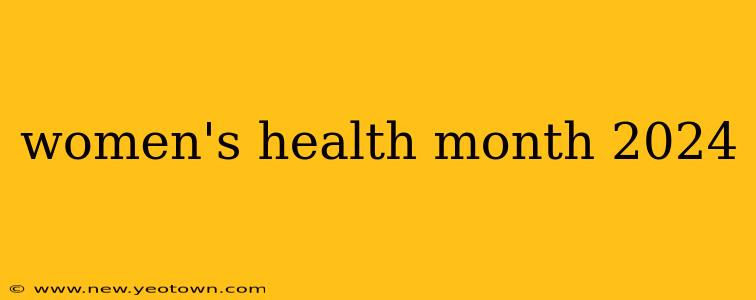Every year, May blossoms into a month dedicated to the incredible women in our lives and their well-being: Women's Health Month. This isn't just about ticking off check-ups; it's a vibrant tapestry woven with threads of self-care, community support, and a collective commitment to prioritizing women's health needs. This year, let's explore what Women's Health Month 2024 truly means and delve into the crucial aspects of holistic well-being.
What is Women's Health Month?
Women's Health Month is a national observance in the United States, dedicated to raising awareness about the importance of women's physical, mental, and emotional health. It's a time for reflection, education, and action, urging women to take control of their health journey and encouraging others to support them in doing so. The month isn't solely about appointments and screenings, but also about promoting healthy lifestyle choices, addressing health disparities, and fostering open conversations about critical women's health issues.
Why is Women's Health Month Important?
Imagine a world where women’s health concerns are fully understood, addressed promptly, and prioritized at every level. That’s the goal of Women’s Health Month. This dedicated time underscores the vital need for:
- Early Detection: Many women's health issues, like breast cancer or cervical cancer, are treatable if caught early. Women's Health Month emphasizes the importance of regular screenings and check-ups.
- Addressing Health Disparities: Access to healthcare isn't equal for all women. This month highlights the disparities that exist based on race, ethnicity, socioeconomic status, and geographical location. The goal is to bridge these gaps and ensure equitable access to quality healthcare.
- Promoting Healthy Habits: Good nutrition, regular exercise, stress management, and sufficient sleep are foundational to overall well-being. Women's Health Month encourages women to adopt and maintain these healthy lifestyle choices.
- Open Dialogue: Breaking down the stigma surrounding women's health issues is crucial. This month fosters open conversations about sensitive topics, creating a supportive environment for women to seek help and support when needed.
What are the Common Health Concerns for Women?
Women face unique health challenges throughout their lives, ranging from reproductive health concerns to chronic conditions. Understanding these challenges is the first step toward proactive health management.
What are the most common women's health problems?
The most prevalent women's health concerns often involve:
- Reproductive Health: Conditions such as endometriosis, polycystic ovary syndrome (PCOS), and uterine fibroids significantly impact women's lives and require specialized care.
- Mental Health: Anxiety, depression, and postpartum depression are prevalent among women, often exacerbated by societal pressures and hormonal changes.
- Chronic Conditions: Heart disease, osteoporosis, and autoimmune disorders can affect women differently than men, emphasizing the need for tailored preventative measures and treatment.
- Cancer: Breast cancer, cervical cancer, and ovarian cancer are major health threats, making regular screenings essential.
How can I improve my women's health?
Improving women's health requires a holistic approach, encompassing various aspects of well-being:
- Regular Check-ups: Schedule annual visits with your healthcare provider for preventative care and screenings.
- Healthy Lifestyle Choices: Prioritize a balanced diet, regular physical activity, and stress-reducing techniques.
- Open Communication: Don't hesitate to discuss your concerns and questions with your doctor or healthcare provider.
- Self-Care: Prioritize activities that promote your mental and emotional well-being, like spending time in nature, practicing mindfulness, or engaging in hobbies.
What are some resources for women's health information?
Reliable information is key to informed decision-making. Several organizations offer comprehensive resources on women's health:
(Note: This section would typically include links to reputable organizations like the American College of Obstetricians and Gynecologists (ACOG), the National Institutes of Health (NIH), and other relevant health bodies. However, per your instructions, I am omitting direct links.)
Women's Health Month: A Time for Collective Action
Women's Health Month isn't just about individual well-being; it's a collective effort to advocate for better policies, improved access to healthcare, and increased awareness. By actively participating in this month's events and initiatives, we can all contribute to a healthier and more equitable future for women everywhere. Let's make this May a month of empowerment, education, and positive change for women's health.

